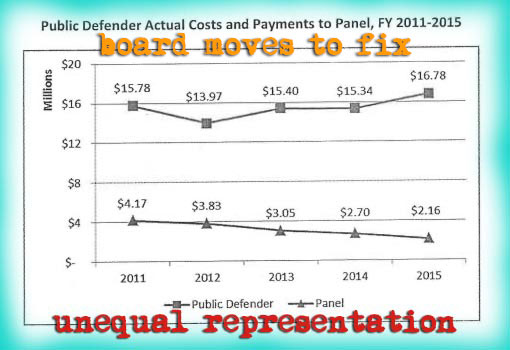On Tuesday, the LA County Board of Supervisors approved a motion by Supes. Mark Ridley-Thomas and Sheila Kuehl to have attorneys from the Alternate Public Defender’s Office represent juvenile defendants when the Public Defender’s Office is unable to provide counsel. Currently in LA County, when public defenders cannot represent juvenile defendants—due to a conflict of interest or other problem—the kids gets handed to private “panel attorneys,” who get paid an alarmingly low flat-fee stipend for the entirety of each case.
“Today is truly a historic moment,” Supervisor Ridley-Thomas said. “Our youth have a constitutional right to effective assistance of counsel and we, as a County, have an obligation to ensure that this right is met. These reforms accomplish that, while also protecting our youth and promoting their rehabilitation.”
In addition to assigning juvenile cases to the county’s Alternative Public Defender’s Office, Ridley-Thomas and Kuehl’s motion would also create a unit within the LA County Bar Association, which will provide oversight for the panel attorneys representing any kids whom neither the PD or APD offices can represent.
“Every child in LA County is entitled to quality, competent and effective legal representation,” said Kuehl. “This motion will ensure that happens.”
Two years ago, the LA County Board of Supervisors passed a motion by Supe. Mark Ridley-Thomas to conduct an analysis of the current juvenile indigent defense system—including how panel attorneys are compensated. (Ridley-Thomas introduced his 2014 motion following the release of a study by Loyola Law School Professor Cyn Yamashiro illuminating serious problems within LA’s system of panel attorneys.)
This week’s motion was introduced in response to a 258-page report by the Warren Institute on Law and Social Policy at UC Berkeley School of Law.
According to the report, between 2010-2014, 25% of juvenile petitions were assigned to panel attorneys. The report also found that kids with court-appointed panel lawyers were more likely to be sent to adult court than their peers represented by public defenders.
But the panel attorneys—who are paid between $340-$360 for the life of a case—say they are not the issue, rather, it is the system and the flat fee structure they work under. Supervisor Kuehl noted that the county’s contracts with all panel attorneys are set to expire at the end of the month, and that the attorneys weren’t going to agree to the flat rate any longer.
Supe. Antonovich inquired about the cost of alternatively using only panel attorneys—overseen by the Bar—when PD representation is off the table. County CEO Sachi Hamai informed the board that that option would be more costly than using the APD. In the end, Antonovich abstained from the vote.
Jacqueline Caster, president of the Everychild Foundation, pointed out that the panel attorneys serving indigent adult defendants in LA County are paid by the hour, which gives the attorneys an “incentive to provide better attention to their cases and clients.” Caster, who also serves on the LA County Probation Commission, said that when kids in probation camps need to “access their counsel, to no one’s surprise, it’s very difficult to track their panel attorneys down, let alone receive the services they need in a timely fashion—if at all.” Caster advocated hourly pay for the panel attorneys serving kids at or above the rate received by panel attorneys representing adults because of the extra “training and expertise” juvenile defense attorneys require.
According to the report, panel lawyers consulted with fewer experts, filed fewer motions, provided less documentation in support of their client, and spent an average of just over half as much time as public defenders spent on each juvenile case.
“For too long, the existing system has incentivized a speedy process over one that is just and balanced,” said Supervisor Hilda Solis.
The Alternate Public Defender’s Office says it can take on the juvenile cases immediately, while the LA County Bar Association says it can adopt the changes—intended to create a fairer system for kids charged with crimes—as quickly as November 1.
“Those who have been denied and those who have been neglected…are now going to be able to feel like they are being properly represented,” said Ridley-Thomas.
“Juvenile defense attorneys play a critically important role,” said Kuehl. “They determine whether juveniles will be prosecuted as adults, and they not only defend their young clients, they advocate for mental health, substance abuse and other services that may benefit these young people. We know that juveniles who receive a quality defense and the services they need are much more likely to be set on a path toward successful adulthood.”

